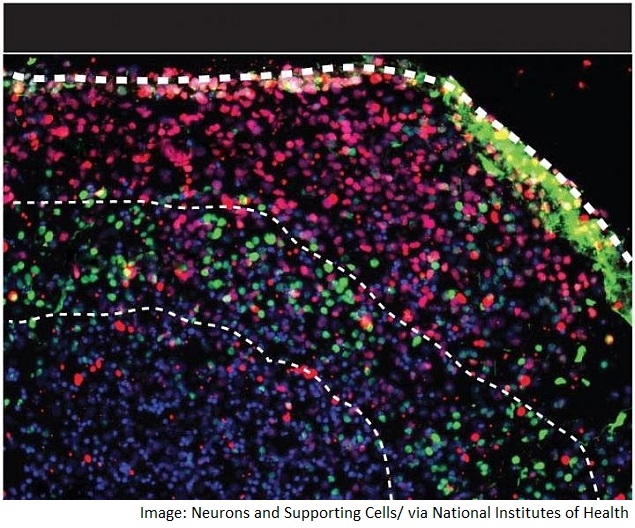- Home
- Science
- Science News
- Scientists Create 'Talking' Neurons
Scientists Create 'Talking' Neurons

Scientists have perfected mini-cultured 3D structures that grow and function much like the outer tissue (cortex) of the brain of the person from whom they were harvested.
Strikingly, these "organoids" buzz with neuronal network activity where cells talk with each other in circuits much as they do in our brains.
This evolving "disease-in-a-dish" technology is bringing closer the day when patients can ask for personalised medicines, said the study, funded by the US National Institutes of Health (NIH).
"The cortex spheroids grow to a state in which they express functional connectivity, allowing for modeling and understanding of mental illnesses," said Thomas R Insel, director of the National Institute of Mental Health.
Prior to the study, scientists led by Sergiu Pasca of the Stanford University had developed a way to study neurons differentiated from stem cells derived from patients' skin cells.
They had even produced primitive "organoids" by coaxing neurons and support cells to organise themselves, mimicking the brain's own architecture.
Based on a streamlined method, Pasca's team's cortex-like spheroids harbour healthier neurons, resulting in more functional neural connections and circuitry.
Like the developing brain, the neurons form layers and talk with each other via neural networks.
"While the technology is still maturing, there is great potential for using these assays to more accurately develop, test safety and effectiveness of new treatments before they are used in individuals with a mental illness," said David Panchision, programme director for stem cell research.
The paper appeared online in the journal Nature Methods.
Get your daily dose of tech news, reviews, and insights, in under 80 characters on Gadgets 360 Turbo. Connect with fellow tech lovers on our Forum. Follow us on X, Facebook, WhatsApp, Threads and Google News for instant updates. Catch all the action on our YouTube channel.
Related Stories
- Samsung Galaxy Unpacked 2025
- ChatGPT
- Redmi Note 14 Pro+
- iPhone 16
- Apple Vision Pro
- Oneplus 12
- OnePlus Nord CE 3 Lite 5G
- iPhone 13
- Xiaomi 14 Pro
- Oppo Find N3
- Tecno Spark Go (2023)
- Realme V30
- Best Phones Under 25000
- Samsung Galaxy S24 Series
- Cryptocurrency
- iQoo 12
- Samsung Galaxy S24 Ultra
- Giottus
- Samsung Galaxy Z Flip 5
- Apple 'Scary Fast'
- Housefull 5
- GoPro Hero 12 Black Review
- Invincible Season 2
- JioGlass
- HD Ready TV
- Laptop Under 50000
- Smartwatch Under 10000
- Latest Mobile Phones
- Compare Phones
- OPPO K14x 5G
- Samsung Galaxy F70e 5G
- iQOO 15 Ultra
- OPPO A6v 5G
- OPPO A6i+ 5G
- Realme 16 5G
- Redmi Turbo 5
- Redmi Turbo 5 Max
- Asus Vivobook 16 (M1605NAQ)
- Asus Vivobook 15 (2026)
- Brave Ark 2-in-1
- Black Shark Gaming Tablet
- boAt Chrome Iris
- HMD Watch P1
- Haier H5E Series
- Acerpure Nitro Z Series 100-inch QLED TV
- Asus ROG Ally
- Nintendo Switch Lite
- Haier 1.6 Ton 5 Star Inverter Split AC (HSU19G-MZAID5BN-INV)
- Haier 1.6 Ton 5 Star Inverter Split AC (HSU19G-MZAIM5BN-INV)







![[Partner Content] OPPO Reno15 Series: AI Portrait Camera, Popout and First Compact Reno](https://www.gadgets360.com/static/mobile/images/spacer.png)








